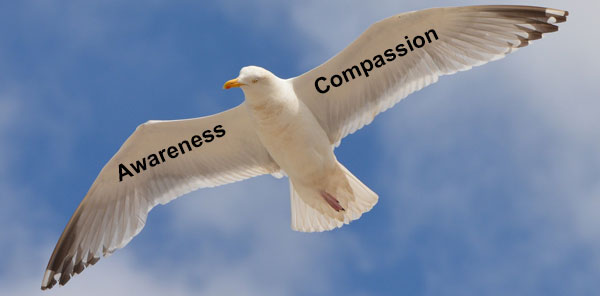I enjoyed reading Tara Brach’s book Radical Compassion so much that I was drawn to an earlier work, Radical Acceptance: Embracing Your Life with the Heart of a Buddha. Both books serve up sound teaching, real life examples, and context-specific meditations. While neither last week’s post nor this one will capture the richness of the text, I’ll highlight a few concepts that struck home.
Tara defines radical acceptance as a willingness to experience ourselves and our lives just as they are. It’s comprised of two mutually reinforcing elements: the ability to see clearly in the present moment (i.e., awareness), and the ability to hold that experience with kind and loving attention (i.e., compassion). Both elements are essential for acceptance to take flight. Awareness alone feeds our inclination to analyze our experiences and get caught up in stories about them. Compassion alone makes us vulnerable to self-pity.

A critic might argue that acceptance diminishes motivation for continuous improvement. If we deem ourselves “OK,” why bother changing? Tara would argue just the opposite. When we bring a kind and clear attention to our humanity with all its limitations and capacity for error, we disrupt reactivity – e.g., fear, shame, anxiety – and the defense mechanisms that go with them. We acknowledge what is. We allow ourselves to feel what we need to feel and then move forward with positive action. Unprocessed pain keeps us stuck, if not miserable. “Pain is inevitable, but suffering is optional.”
A critic might also argue that acceptance negates responsibility. Again, this critique proves misguided. Having mindful awareness and compassion for our actions does not release us from responsibility for them. Rather, it relieves us of the self-hatred and recriminations that thwart our ability to respond appropriately, make reparations, and restore right relationship with ourselves and others.
Radical acceptance makes space for acknowledging and responding to human desire. The world is full of sensory stimuli that give us pleasure – a beautiful sunset, a delicious meal, the aroma of freshly baked bread, an uplifting song, the touch of a loved one’s hand. We can also take great pleasure in our work and the sense of accomplishment that comes from mastering skills or attaining goals. And we can enjoy the companionship of lovers, family, friends, colleagues, and acquaintances. Human desire does not make us less righteous or spiritual. Quite the contrary! Desires and their fulfillment confer a profound sense of being alive. That being said, our awareness calls us to the recognition that all such experience proves transient. We must counsel ourselves to be free from overly identifying with them. No matter how gratifying our experiences, we cannot hold tight to circumstances that are by their very nature in a constant state of flux.
On what resources can we draw to provide support for the experience of radical acceptance? Tara names three fundamental refuges that offer sanctuary for our awakening hearts and minds.
An awakened nature enables us to surrender into an experience of boundless compassion with the prayer, “I take refuge in the Beloved,” or, “I take refuge in the awakening heart-mind.” An awakened nature does not promise the absence of fear, but rather a refuge that is vast enough to hold our fear and vulnerability with lovingkindness. It is the promise of freedom and serenity.
The dharma (the path or the way) recognizes that everything within and around us is subject to change. It cautions against the temptation to resist or hold on to the stream of experience. By taking refuge in the dharma, we awaken from the trance of fear and realize our true nature.
The sangha (community of spiritual aspirants) tells us that we belong to all those who desire to awaken. As Tara says:
“Being with good friends helps us relax about our inner weather and stop regarding our painful emotions or confused behaviors as symptoms of spiritual backsliding. As we bring our vulnerability, insight and heart into conscious relationship, we realize we are all waking up together. In this environment of togetherness, deep healing becomes possible… [Moreover] when radical acceptance blossoms in our relationships, it becomes a kind of spiritual reparenting that enables us to trust the goodness and beauty of who we really are.”